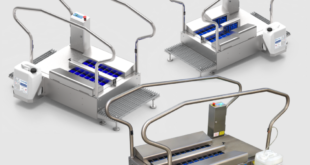Martin Gadsby looks at the latest trends in Process Analytical Technology (PAT) and digitalisation shaping the pharmaceutical manufacturing industry
Looking back on 2020 and 2021, what stands out to you on what happened in the pharma manufacturing industry regarding digitalisation of the manufacturing floor (from the perspective of your segment of the business in particular)?
With the increased demands on pharmaceutical research and development programs as well as production, it has become crucial to enhance the flexibility, responsiveness and productivity of new and existing facilities.
The key role of smart manufacturing strategies that support these goals has become even clearer, driving the development and adoption of a fast-growing number of industrial automation projects in the sector. This has been witnessed across the board, as companies of all sizes and in all areas are actively pursuing digitalisation programs, conducting discussions, making fundamental decisions and turning them into action.
More specifically, a PAT-driven framework is recognised to be the keystone of many smart manufacturing programs. This technology is critical if digital transformation programs demand decisions based on real-time product quality measurements. For pharmaceutical manufacturers, the early integration and development of this framework, in both R&D and manufacturing, as part of digital transformation initiatives, is the most effective route to reducing costs whilst improving quality and ultimately maximising gains that offer a real and tangible return on the investment (ROI).
A PAT knowledge management platform, such as Optimal’s software, synTQ, is not only central to a PAT framework, but also forms the nucleus of many digital transformation initiatives. The value of such a solution is being increasingly recognised by businesses and the industry in general. synTQ was recently acknowledged for its role in smart pharmaceutical manufacturing by winning the Pharma Innovation Award 2021.
This software enables companies to capture quality and production information in real-time. If required, it can control the process using this real-time quality data, not just by using empirical recipe data. This critical information can be visualised and shared with a myriad of other systems to create data-driven, smart, flexible manufacturing plants. These benefits extend to the entire enterprise while ensuring total regulatory compliance and data integrity. A knowledge management platform such as this can also provide a flexible yet comprehensive way to integrate analytical and R&D laboratories into your digital factory.
What do you predict for
The adoption of digital technologies for process control and quality assurance will continue to accelerate and enhance the competitiveness of pharmaceutical manufacturers. The success of innovative applications from companies that are already further along their digital transformation journeys will drive the adoption of PAT and industrial automation in more and more facilities.
Ultimately, this transition will greatly improve the sector as a whole, with shorter timeframes to deliver new products to market, enhanced quality and consistency as well as reduced manufacturing costs that lead to more economical drugs. These advantages are benefitting both forward-looking pharmaceutical businesses as well as patients around the world, as the level of availability of key medications is improved.
Moreover, data-driven smart manufacturing can support onshoring and personalised medicine, the latter also known as precision medicine, offering next-level efficacy, delivery and reliability based on an individual’s needs, enabling patient-centric healthcare.
Optimal is continuously implementing PAT-driven automated process control and quality assurance solutions that considerably increase throughput and product consistency while cutting cycle times and waste. In addition to supporting the development of new plants, the company has been helping customers to upgrade their existing facilities to better serve changing market demands and support onshoring by reducing the manufacturing cost.
In order to incorporate the latest, most promising digital technologies into the company’s PAT knowledge management platform, synTQ, Optimal constantly develops and deploys new functionalities. In particular, the latest software version incorporates dynamic flow modelling, advanced intelligent control for automated, multivariate control, Cloud data pump and digital twin functions. These features support the faster implementation of PAT, the acquisition and generation of unique process understanding and actionable insights, the transfer and storage of key information as well as the orchestration of processes, instruments and equipment while ensuring regulatory compliance.
Image caption: Process Analytical Technology (PAT) and digitalisation can create key opportunities for the pharmaceutical manufacturing industry
Martin Gadsby is Director at Optimal Industrial Automation and Optimal Industrial Technologies.
 Engineer News Network The ultimate online news and information resource for today’s engineer
Engineer News Network The ultimate online news and information resource for today’s engineer



